Paul Levinson's Blog: Levinson at Large, page 245
August 21, 2016
Fear the Walking Dead 2.8: Nick and the Talking Dead, Literally
 Fear the Walking Dead returned for the second part of its second season, with an episode - 2.8 - that featured Nick and a few of the best scenes we've seen in either of The Walking Dead series.
Fear the Walking Dead returned for the second part of its second season, with an episode - 2.8 - that featured Nick and a few of the best scenes we've seen in either of The Walking Dead series.The very best, for me, was Nick walking with the walking dead, and imagining them speaking to him, gradually more discernibly, until we literally had the talking dead, but with no Chris Hardwick. Now it would've been a wild change indeed if somehow some of the dead were indeed able to talk, and you never know completely with these shows, but the speaking in Nick's imagination was wild enough in itself.
We already knew, from earlier in the season, that Nick walked with the dead, and feels a sort of kinship to them. But seeing him walk with them, experiencing this from the inside out, was impressive and memorable. The way he got there was, too. He's limping not because he's putting on the gait of the dead, but because he was bitten in the leg by a savage dog. And, in the end, he can't even keep up the with the dead. He's not stronger than the walkers, but in a real sense weaker, and his collapse on the highway made perfect sense. It's saying, in effect, that the dead are in some sense stronger, less vulnerable, than the living - something we already knew from The Walking Dead, but never saw so clearly before with our very eyes on the screen.
The ending of this episode, though happy, was also the one trite element in this hour. I mean, how many times are we going to see one of our heroes end of up in a town that looks like a piece of paradise in this infected world?
On the other hand, given what Trump thinks of Mexicans in our own real world, this happy ending was a tonic and good to see. And I'll be back here with more as the season progresses.
See also Fear the Walking Dead 2.2: Almost the Last Night of the World
And see also Fear the Walking Dead 1.1: Great Beginnings ... Fear TWD 1.2: Tobias Leads the Way ... Fear TWD Season 1 Finale: Water Water
#SFWApro
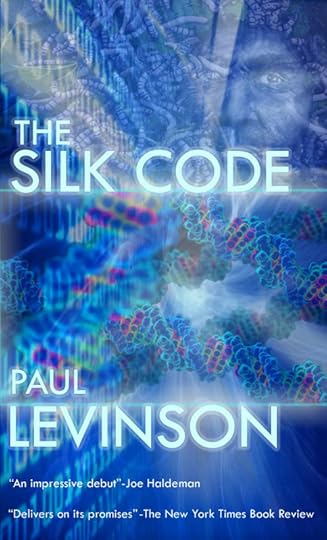
Paul Levinson's books ... Paul Levinson's music
Published on August 21, 2016 22:19
The Fifth Wave: Pretty Good, Actually
 Just saw The Fifth Wave on Starz. The film received a fistful of negative reviews - see the summary on The Fifth Wave's Wikipedia entry - but I find critics to often be pretentious ignoramuses anyway, and guess what, I liked the movie.
Just saw The Fifth Wave on Starz. The film received a fistful of negative reviews - see the summary on The Fifth Wave's Wikipedia entry - but I find critics to often be pretentious ignoramuses anyway, and guess what, I liked the movie.Which is not to say it's great - far from it - but it has a lot to like. Apropos Starz, it has a lot of impressive star power, with Liev Schreiber (Ray Donavon), Maggie Siff (Sons of Anarchy), and Maria Bello (kitchen sink) in very well-played supporting roles. And as to the leads, Chloë Grace Moretz, Nick Robinson, and Ron Livingston are more than good enough to carry the story.
And what is the story? Well, alien invasions are as cliched as they come, but this one manages to break some new ground, in the five-stage (five waves) strategy they apply to rid the Earth of us, the human inhabitants. The key is explained about two-thirds through the movie: you bomb a house for insects, but some always survive, so you have to devise more innovative, hand-to-bug methods to get the very last ones. It's a strong idea, straight from the 2013 novel of the same name by Rick Yancey.
Since I haven't read the novel, I don't know if the one part that bothered me is due to the book or the movie adaption. It was a ham-handed love conquers all theme, wherein an alien guy falls in love with the heroine Cassie, and turns on his own kind to help her and humanity. Not that I object to love as a motivator. But laying it all out in a five minute narration was not very convincing, and only made it because Chloë Grace Moretz as Cassie is so innocently appealing.
But when the movie was over, I found myself wanting more of the story, which means with all its flaws, The Fifth Wave did a lot right. Let's hope there's a sequel. And, critics, should you see it, get your heads out of your backsides and learn to relax and enjoy a movie.
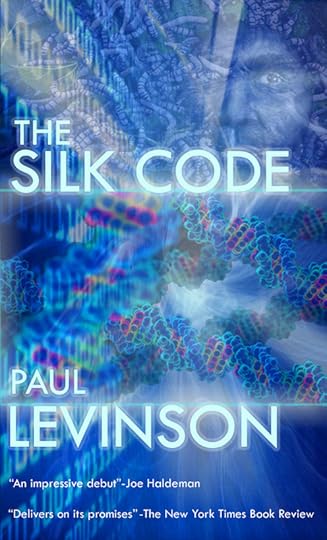
a different kind of attack on humanity ...
Paul Levinson's books ... Paul Levinson's music
Published on August 21, 2016 00:25
August 20, 2016
Stranger Things 1.6-1.8: Lando to Fringe
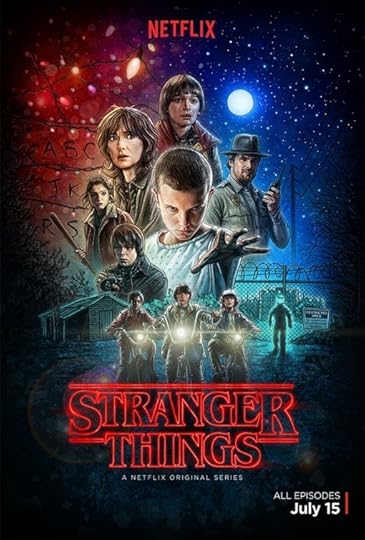
And herewith a review of the last three episodes of Stranger Things, Season 1 -
I say Season 1, because the ending certainly cries out for another season. That, and the justified popularity of Season 1, makes a second season a dead certainty - or maybe live certainty would be a better word, given the context.El aka Eleven is certainly alive in some form - why else would Hopper be leaving her favorite food for her out in the woods? And this of course opens a whole bunch of questions starting from what happened to her when she destroyed the monster, to why is she hiding in or near the woods?Will's being infected by the tentacled monster is the trite part of the ending, but it provides a good, dangerous foundation for things to come.Is Barb dead? Probably/maybe - I thought I saw her with a tentacle in her mouth, and no one as far as we know rescued her, but you never know.Dr. Brenner looks like he was killed, too - but without seeing a dismembered or eaten-before-our-eyes body, you never know about that, either.In general, I'd say this fine series is most reminiscent of Fringe, especially with the tank of water being a conduit to another plane. Fringe, of course, was 21st century not 1980s, but it was very 1950s retro - see Fringe Science for more on this - so Stranger Things is retro even if it comes by that via an intentional or unintentional indebtedness to Fringe.
Stranger Things also has a great sense of humor, with the riffs on Lando Calrission being my favorite in the concluding episodes. Bring on the next season already!
See also Stranger Things 1.1-1.5: Parallel Horror
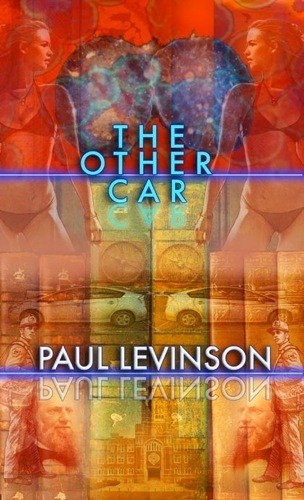
more parallel worlds ... "flat-out fantastic" - Scifi and Scary
Paul Levinson's books ... Paul Levinson's music
Published on August 20, 2016 20:29
Stranger Things 1.1-1.5: Parallel Horror
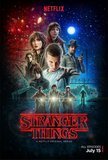 So I saw the first five episodes of Netflix's Stranger Things on a colleague's recommendation, and really enjoyed. I'll see the rest tonight, and put in a review after that, but I thought I'd say a few things about the series now.
So I saw the first five episodes of Netflix's Stranger Things on a colleague's recommendation, and really enjoyed. I'll see the rest tonight, and put in a review after that, but I thought I'd say a few things about the series now.First, it's correctly billed as "science fiction horror". Horror can come in two flavors, science fiction and fantasy, and like the dichotomy in general, it hinges on whether the story has scientific plausibility. For example, if a vampire story hinges on a virus, an alien invasion, or a mutation in our species, it would be science fiction horror. If, on the other hand, vampires arise due to some inchoate curse, we're dealing with fantasy horror.
Stranger Things is definitely science fiction. In addition to the campy scientists, we have a teacher giving a great little talk about Hugh Everett's "many worlds" interpretation of quantum physics - that is, an infinitely of possible worlds, much like but subtly different from ours, set off by whatever events. That may not be scientific fact, but it's certainly plausible science theory, and is the bulwark of Stranger Things, and makes it very different from A Nightmare on Elm Street, however much the two may share the same teen horror angst.
Indeed, though much has been made about the homages Stranger Things provides to Wes Craven and the 1980s, it cuts a swath all its own. It needed to be situated in the 1980s, in an age before cell phones with cameras, because the lack of ready contact and photographic evidence is essential to the isolation of our characters and their inability to prove what they know to be true. Thus the 80s accoutrements are not so much homages as they essential conveyors of the story.
I'll be back with more when I've finished the series, but it looks like, once again, Netflix has stepped up with a narrative that soars above what is usually found on the networks and cable, including, in this case, series on the Syfy Channel.
See also Fringe 1.6-1.8: Lando to Fringe

more parallel worlds ... "flat-out fantastic" - Scifi and Scary
Paul Levinson's books ... Paul Levinson's music
Published on August 20, 2016 10:22
August 18, 2016
Occupied on Netflix and Trump
 Just finished streaming Occupied on Netflix. It was not only good, often riveting, in its own right, but offered a disturbing projection of the world if Donald Trump were somehow elected President of the United States.
Just finished streaming Occupied on Netflix. It was not only good, often riveting, in its own right, but offered a disturbing projection of the world if Donald Trump were somehow elected President of the United States.Occupied takes place in Norway, slightly in the future. The country has decided to go all-green, give up fossil fuel completely, in the wake of a terrible environment crisis. Its neighbors the European Union and Russia don't like this. Russia decides to do something about it. They come into Norway, over the objections of its weak government, and keep the fossil fuel plants humming. The EU does nothing about this.
And what about the United States, long an alley of Norway and no friend of Russia? In this near-future scenario, the U.S. has pulled out of NATO, and has an isolationist stance, similar to what some Americans wanted at various times in the 20th century.
In our reality, Trump wants to pull out of NATO now (though he's also said, at times, that he doesn't, typical of his often incoherent campaign). But a United States unwilling to stand up for Norway, especially to Russia, is completely consistent with the footsies Trump has been playing with Putin, and his often otherwise isolationist rants.
The U.S. is frequently depicted poorly in European drama, something which I'm not particular pleased about but which I've become used to. But in Occupied, given what we're now seeing with the likes of Trump, this depiction is not unjustified.
The story itself is excellent and suspenseful, with all kinds of unexpected twists and turns, especially at the end. It's reminiscent of Borgen - the Danish political drama - with a little Homeland thrown in. Highly recommended summer viewing - especially this summer, when an isolationist United States is not that far from fiction.
Based on an idea by Jo Nesbø, directed by Erik Skjoldbjærg, who says a second season is in the works.
In the meantime, here's the Dylanesque "Black and Gold" from the opening credits. By Sivert Høyem - also a little reminiscent of Gordon Lightfoot.
Paul Levinson's books ... Paul Levinson's music
Published on August 18, 2016 11:26
August 17, 2016
Silvercup North in the Morning
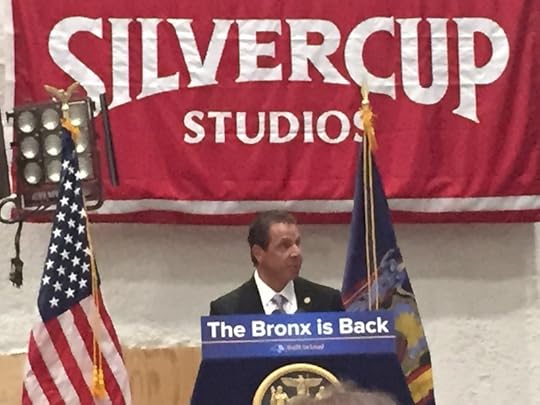
I spent a wonderful hour this morning at the opening ceremony of Silvercup North - the spacious new, third motion picture and television production studio of Silvercup Studios in the Port Morris area of the Bronx - where New York Governor Andrew Cuomo was the featured speaker.
Everything about this ceremony was right. I grew up in the Bronx, a little north of Port Morris around Allerton Avenue and White Plains Road. I've been a professor at Fordham University (the Governor's alma mater), across the street from the Botanical Gardens and the Bronx Zoo, since 1998.
I grew up eating Silvercup bread. The very sign makes me hungry and smells good. "The Bronx is Back" looked good, too. And although I moved up to White Plains from the Bronx with my family in the early 1990s, the Bronx was never really gone for me.
The is the first time I've had the pleasure of hearing Andrew Cuomo speak in person. And it was a pleasure, indeed. Our governor is articulate, humorous, and sharp as a whip. Somewhere down the line, I'd like to see him run for President. Bronx Borough President Ruben Diaz, Jr., who introduced Cuomo, also has a great future ahead. Like the Governor, Diaz got involved in politics via his father, Ruben Diaz, Sr., who is currently a NY State Senator and took a bow from the audience.
The Suna Brothers, who brought Silvercup Studios to prominence in Queens in the 1980s, were on hand. Silvercup Studios has already made an enormous contribution to New York and the world's popular culture. The studio was talked about on panels at The Sopranos Conference I organized at Fordham University in 2008 - lots of The Sopranos was filmed at Silvercup in Long Island City.
 As many of you know, time travel is one of my passions - as a reader, viewer, and author. I was therefore delighted to hear, and consider it a most auspicious omen, that the first production in Silvercup North will be ABC-TV's Time after Time, based on the movie about the young H. G. Wells. What more could you ask for! (Shameless plug, H. G. Wells makes an appearance in my Ian's Ions and Eons - the name of a time-travel agency located a little off Johnson Avenue in the Riverdale section of the Bronx.)
As many of you know, time travel is one of my passions - as a reader, viewer, and author. I was therefore delighted to hear, and consider it a most auspicious omen, that the first production in Silvercup North will be ABC-TV's Time after Time, based on the movie about the young H. G. Wells. What more could you ask for! (Shameless plug, H. G. Wells makes an appearance in my Ian's Ions and Eons - the name of a time-travel agency located a little off Johnson Avenue in the Riverdale section of the Bronx.)As icing on the cake of this morning, it was great to see Gary Kesner, Executive VP at Silvercup. Gary and my wife Tina were in class together many years ago at the Bronx High School of Science - there's the Bronx again - and we've stayed in touch all too sporadically over the years.
Thanks to Jim Jennewein, Artist in Residence at Fordham University, for inviting me to this event, and to Rachel Honan, photographer and our student at Fordham, who conversed with us before the speeches.
Good times for the Bronx on street and screen beckon ahead!
Paul Levinson's books ... Paul Levinson's music
Published on August 17, 2016 09:52
August 15, 2016
The Night Of #6: Three Suspects
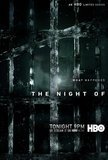 So as of episode #6 last night, we now have three suspects in the murder - other, of course, than Naz.
So as of episode #6 last night, we now have three suspects in the murder - other, of course, than Naz.In episode 5, last week, our attention was brought to bear on the guy who did not come forth to police when his friend did, after the two encountered Naz and Andrea right outside her apartment. In fact, Trevor went out of his way not to mention his friend, when he gave his otherwise truthful (as far as know) account to the police. I guess Trevor himself can be considered a suspect, but his friend certainly seems more suspicious.
Then there's the guy who offered Andrea a ride in his hearse. He either could be someone hired to track her and kill her, or someone who took a sick, lethal liking to her, and followed through.
And if we're talking about someone hiring Andrea's killer, we now have Don Taylor, and a nice big financial motive. He also doesn't seem to be a very nice guy, for whatever that's worth.
So where does that leave us? The killer could still be Naz, a possibility the story is keeping at least slightly in play by revealing his past propensity for violence (and which we've seen again in prison), but I still don't think so. I thought from the beginning that maybe Naz's brother was somehow the killer, but we've seen nothing in that direction at all, so far. And the killer could still be someone we haven't met as yet - but it's getting pretty late for that.
So I would say there's a better than 50/50% chance it's one of three main suspects, but I wouldn't put money on any one of them, and not overwhelming odds on it even being one of three. I would add that there's no way Andrea committed suicide, and since this is not science fiction, it can't be the cat.
But the cat has some connection to this, and, at very least, it's good to see Jack taking care of the cat, and his foot condition finally cured!
See also The Day After The Night Of on HBO ... The Night Of #3: The Schlep vs. the Star ... The Night Of #4: Chandra To The Rescue

a different kind of crime ...
Paul Levinson's books ... Paul Levinson's music
Published on August 15, 2016 13:37
Peaky Blinders Season 3: Still Peak
 Finally had a chance to see the third season of Peaky Blinders on Netflix - available for a few months now - and happy to report that it's superb, as good or better than the first two seasons.
Finally had a chance to see the third season of Peaky Blinders on Netflix - available for a few months now - and happy to report that it's superb, as good or better than the first two seasons.I'll try not to give you too much away - there are lots of surprises, well worth waiting for.
First and foremost comes at the very end, when Thomas comes up with a unique way to keep his family and business together. Totally unforeseen, and astonishing.
We also have a shocking death, early in the season, which changes, well, not everything, but a lot. As much as I regretted this happening, it gives the story a jolt, to say the least.
Arthur and John are in fine form - including in one scene in which tattoos are searched for - and Michael and Polly have an important roles, too. Tom Hardy is memorable, again, as Alfie, and in fact all the acting is outstanding, with Cillian Murphy and Paul Anderson in the lead.
As always, Tommy has his hands full, fighting old and new enemies, and keeping his family in line and resistant to inner and outer demons. After three seasons, I would say that Peaky Blinders has equalled or exceeded Boardwalk Empire, and may be on its way to giving the Godfather saga a run for its money.
England in the 1920s is a great locale for this story, mixing cars and horses, Soviets and locally corrupt authorities of all stripes. The third season, like the first two, is just six episodes, leaving plenty more to tell in the story. So you here next year!
See also Peaky Blinders: Peak Television

deeper history
#SFWApro
Paul Levinson's books ... Paul Levinson's music
Published on August 15, 2016 12:42
August 14, 2016
Tyrant 3.6: Alive
 A rare Tyrant 3.6 this past week, in which almost no major character was killed.
A rare Tyrant 3.6 this past week, in which almost no major character was killed.Al-Qadi did have a pretty close call, at the hands of Ihab Rashid, who is stopped at the last minute by a wiser, more ingeniously devious Caliphate leader. And the plan worked, putting Al-Qadi, who was one of Abuddin's best hopes for reconciliation, right in the cross-hairs of Bassam's rage.
This whole season, as I've mentioned before, can be seen as a story of how Barry is inexorably becoming more like his now late brother, and the true tyrant in this saga. About all Bassam has going for him now is a son who does love him, and Daliya, who, I was very glad to see, wants very much to continue her relationship with Bassam.
She was also almost killed in this episode - good thing she wasn't - in the bomb that took Bassam's murderous butler or chief aide, or whatever exactly he was. He certainly had it coming, given his killing of poor Nusrat, and I wouldn't consider him quite a major character, which is why I said almost none were killed in 3.6.
But back to Daliya, there's still a big loose end which can hurt Bassam, since Fauzi still does not know about Daliya and Bassam. In a satisfying scene, she broke the news to Fauzi that he'd be ill-advised to wait for you her, and he took it pretty well, but there's no telling what seeing or hearing about Daliya in Bassam's arms will evoke in Fauzi, and there's obviously a lot of pent-up dynamite to explode.
Sammy knows about his father and Daliya, but he has no connection to Fauzi and won't tell him even if he did. But ... what about Leila? She also has her suspicions, and who knows what she might do and unleash to further her ambitions.
Good viewing ahead.
See also: Tyrant 3.1: Barry -> Bassam ... Tyrant 3.2: Whither Molly? ...Tyrant 3.3: Double Death ... Tyrant 3.5: Basham and Daliya
And see also: Tyrant 2.1: The Tyrant's Character ... Tyrant 2.5: The Caliphate ... Tyrant Season 2 Finale: Deserves to be Renewed
And see also: Tyrant: Compelling Debut ... Tyrant 1.2: The Brother's Speech and His Wife ... Tyrant 1.3: A New Leaf? ... Tyrant 1.4: Close to the Bone ...Tyrant 1.6: Don't Mess with Jamal ... Tyrant 1.7-8: Coup ... Tyrant 1.9: Tariq ... Tyrant Season 1 Finale: The Truest Tyrant
#SFWApro

and earlier in the Middle East ...
Paul Levinson's books ... Paul Levinson's music
Published on August 14, 2016 12:55
August 11, 2016
The Downfall of Julian Assange
One of my favorite quotes come from John Maynard Keynes, "when the facts change, I change my mind" (see Goodreads for a list of my favorite quotes). This has now happened regarding my opinion of Julian Assange and Wikileaks.
1. When Assange and Wikileaks were releasing classified government documents, which detailed what our government was saying behind the scenes about our foreign policy maneuvers, I thought that was akin to what Daniel Ellsberg had done with the Pentagon Papers regarding our involvement in the Vietnam War - i.e., good for freedom and our democracy. I noted that then Secretary of Defense Gates said those initial Wikileaks had not endangered any American lives, and that Ellsberg himself said he stood with Assange.
2. I took pause, and was certainly concerned, when Assange was accused of sexual molestation and "lesser rape" in Sweden shortly after (details here). But I thought Michael Moore made a good point when he wondered if the CIA or some other governmental organization was conveniently trying to frame Assange, and I noted, as time ensued, that no further allegations (that I know of) were raised against Assange regarding his sexual conduct (unlike the egregious Bill Cosby, for example). It was also possible that Assange was a personal predator but still doing the right thing as far as freedom of information and world politics.
3. All of that happened in 2010. Earlier this year - 2016 - I thought Assange's release of DNC emails at the beginning of the Democratic National Convention was not shining a cleansing light on government secrecy, but a heavy-handed attempt to influence our Presidential elections. This was especially grievous, given that the opponent of the Democrats is a fascist, Trump. the likes of which we have never seen get so far in America before.
4. But the straw that finally broke the camel's back for me regarding Julian Assange was his recent implication that Hillary Clinton may have had something to do with the murder of a DNC staffer in Washington DC in July. With this suggestion, Assange has moved from disseminator of classified information and hacked DNC emails, to purveyor of sick conspiracy theories, in league with the arrant nonsense that Hillary killed Vince Foster, etc. It's in league with what Trump has been spewing, and caters to worst elements of humanity.
So, as the Jerry Orbach character says in Dirty Dancing, "when I'm wrong, I say I'm wrong". I was very wrong about Julian Assange. He is part of the problem not the solution. And I can only hope that, whatever happens with the rape charges, he and his business are quickly consigned to the dustbin of history.
Paul Levinson's books ... Paul Levinson's music
1. When Assange and Wikileaks were releasing classified government documents, which detailed what our government was saying behind the scenes about our foreign policy maneuvers, I thought that was akin to what Daniel Ellsberg had done with the Pentagon Papers regarding our involvement in the Vietnam War - i.e., good for freedom and our democracy. I noted that then Secretary of Defense Gates said those initial Wikileaks had not endangered any American lives, and that Ellsberg himself said he stood with Assange.
2. I took pause, and was certainly concerned, when Assange was accused of sexual molestation and "lesser rape" in Sweden shortly after (details here). But I thought Michael Moore made a good point when he wondered if the CIA or some other governmental organization was conveniently trying to frame Assange, and I noted, as time ensued, that no further allegations (that I know of) were raised against Assange regarding his sexual conduct (unlike the egregious Bill Cosby, for example). It was also possible that Assange was a personal predator but still doing the right thing as far as freedom of information and world politics.
3. All of that happened in 2010. Earlier this year - 2016 - I thought Assange's release of DNC emails at the beginning of the Democratic National Convention was not shining a cleansing light on government secrecy, but a heavy-handed attempt to influence our Presidential elections. This was especially grievous, given that the opponent of the Democrats is a fascist, Trump. the likes of which we have never seen get so far in America before.
4. But the straw that finally broke the camel's back for me regarding Julian Assange was his recent implication that Hillary Clinton may have had something to do with the murder of a DNC staffer in Washington DC in July. With this suggestion, Assange has moved from disseminator of classified information and hacked DNC emails, to purveyor of sick conspiracy theories, in league with the arrant nonsense that Hillary killed Vince Foster, etc. It's in league with what Trump has been spewing, and caters to worst elements of humanity.
So, as the Jerry Orbach character says in Dirty Dancing, "when I'm wrong, I say I'm wrong". I was very wrong about Julian Assange. He is part of the problem not the solution. And I can only hope that, whatever happens with the rape charges, he and his business are quickly consigned to the dustbin of history.
Paul Levinson's books ... Paul Levinson's music
Published on August 11, 2016 10:46
Levinson at Large
At present, I'll be automatically porting over blog posts from my main blog, Paul Levinson's Infinite Regress. These consist of literate (I hope) reviews of mostly television, with some reviews of mov
At present, I'll be automatically porting over blog posts from my main blog, Paul Levinson's Infinite Regress. These consist of literate (I hope) reviews of mostly television, with some reviews of movies, books, music, and discussions of politics and world events mixed in. You'll also find links to my Light On Light Through podcast.
...more
- Paul Levinson's profile
- 342 followers



